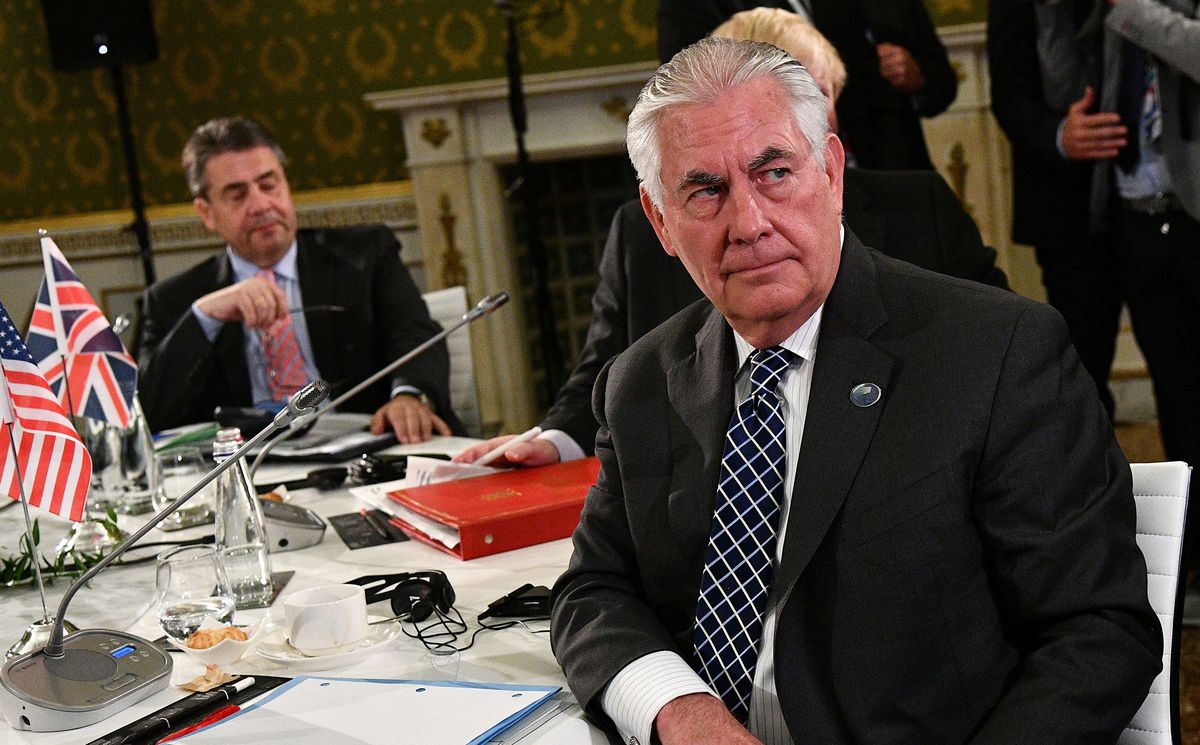Tillerson Says Russia Should Give Up ‘Unreliable Partner’ Assad

EghtesadOnline: Russia must abandon its support of President Bashar al-Assad’s regime if it wants an “important role” in discussions about Syria’s future, Secretary of State Rex Tillerson said, setting up a clash with Russian leaders just before he meets them in Moscow.
President Vladimir Putin’s government has chosen to ally itself with an “unreliable partner” in Assad, whose reign is coming to an end, as well as Iran and Hezbollah, Tillerson told reporters in Lucca, Italy, where he was attending a Group of Seven meeting, Bloomberg reported.
“We want to create a future for Syria that is stable and secure,” Tillerson said on Tuesday. “Russia can be part of that future and play an important role or Russia can maintain its alliance with this group which we believe is not going to serve Russia’s interest longer term.”
Tillerson’s remarks reflected how the U.S. and its allies are stepping up their pressure on Putin in the wake of an April 4 chemical-weapons attack, which Russian leaders and Syria say occurred when a Syrian jet bombed a terrorist weapons cache.
Western leaders have refused to accept that, and hold Russia partly responsible because of its military alliance with Syria and its promise to guarantee a 2013 agreement aimed at eradicating Syria’s chemical-weapons stockpiles. Russia denounced as aggression the U.S. firing of cruise missiles at a Syrian airbase in retaliation for the chemical attack.
‘New Approach’
“What we are offering them is a chance to have a new approach,” British Foreign Secretary Boris Johnson said.
The G-7 meeting in Lucca, where Tillerson also met with allies from Europe, Japan, Turkey and Persian Gulf states, was aimed at giving the U.S. secretary of state a single, unified message to take to Russia. Remarks from Moscow, however, suggested that Putin’s government would resist Tillerson’s approach.
“We’ve seen all this before,” Putin said at a press conference in the Kremlin with Italian President Sergio Mattarella, describing the chemical attack as “a provocation.” Putin said the Syrian events remind him of the run-up to the 2003 U.S. invasion of Iraq, which Russia opposed and which Putin said led to the collapse of the country and a surge in terrorism.
“Syria and Russia provide a common enemy, a very good platform for consolidation” between the U.S. and its western allies, Putin said. “We’re ready to be patient. We hope only that this will end up on some kind of a positive trend.”
His comments came after the Russian Foreign Ministry issued a harsh statement on Tillerson’s visit cataloging the “long list of irritants” in the relationship that it said are Washington’s fault, from Syria to Libya, Afghanistan and Ukraine, and warned of retaliatory steps.
“In the course of the upcoming talks we’d like to find out if the U.S. understands at all the need to stabilize and normalize bilateral ties,” the ministry said in a website statement. It blasted the U.S. for relying on “staged photos of events on the ground” for making its Syria policy.
A military spokesman warned that further U.S. strikes would be “unacceptable.” He added that Russia is ready to guarantee the security of international inspectors at the site of the April 4 attack. Russia has called for an international investigation of the incident.
Russia also said Tuesday that it will host foreign ministers from Syria and Iran, another major Assad backer, for talks in Moscow later this week.
Moscow Visit
The Kremlin so far hasn’t publicly confirmed that Putin will meet Tillerson, saying only that no such session is currently in the president’s schedule. Not meeting a visiting U.S. secretary of state would be a major snub by the Russian leader, however. Putin met Tillerson’s predecessor, John Kerry, on all four of his most recent visits to Russia, even as ties between the two countries spiraled lower, and virtually all of Tillerson’s predecessors met Russian leaders on their inaugural visits.
Demands that Russia abandon its support for Assad are “unrealistic,” said Irina Zvyagelskaya, a Middle East expert at the Institute of Oriental Studies in Moscow. Putin is sticking to the Syrian leader because “there isn’t anyone else” who has his support among the population and ruling elite and can help stabilize the situation through peace negotiations, she said by phone.
In a statement at the end of the G-7 meeting, ministers said Russia can help resolve the Syria crisis and urged leaders there to use their influence with the Assad government. Tillerson reiterated the U.S. policy that it will first focus on fighting the Islamic State and then shift to the political future of Syria. But he made explicit that the U.S. sees no future for the Assad regime in Syria.
Assad Reign
“It is clear to all of us that the reign of the Assad family is coming to an end,” Tillerson said.
He also hardened his message over Russia’s guarantee in a 2013 agreement to secure and eliminate Syria’s chemical weapons. “Stockpiles and continued use demonstrate that Russia has failed in its responsibility to deliver on its 2013 commitment,” Tillerson said.
Italian Foreign Minister Angelino Alfano, who played host to his counterparts, told a closing news conference there was “no consensus on new sanctions” against Russians or Syrians after the chemical attack. Jean-Marc Ayrault of France said Johnson had raised the idea, but it wasn’t even discussed.
Late Monday, President Donald Trump spoke with U.K. Prime Minister Theresa May and German Chancellor Angela Merkel to show unity ahead of Tillerson’s visit.
The U.S. secretary of state “is fully authorized to say when he arrives in Moscow that he is speaking in the wake of taking a strong action in Syria that has the support of his allies,” Canadian Foreign Minister Chrystia Freeland told reporters.


